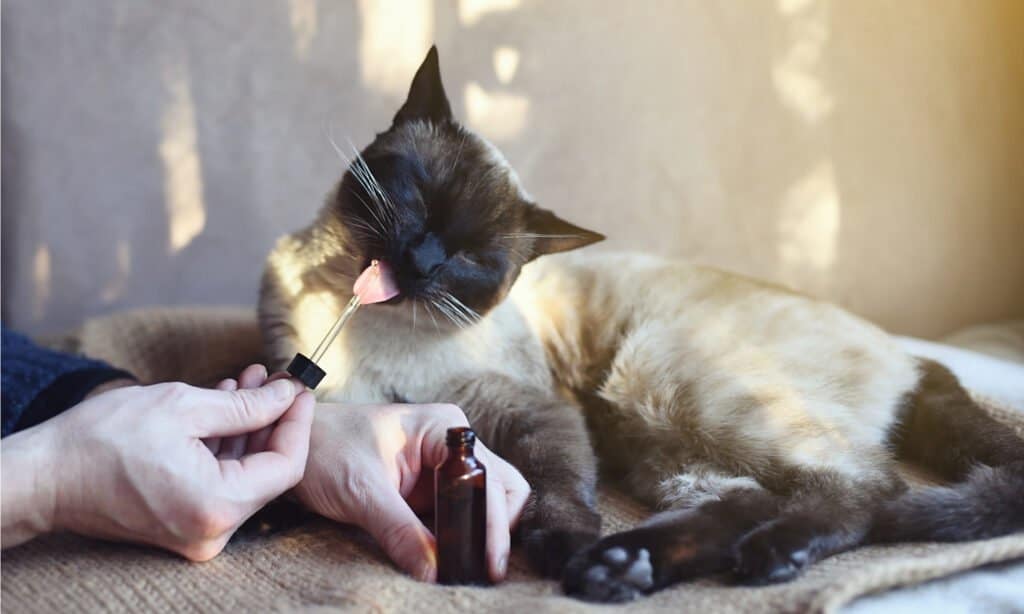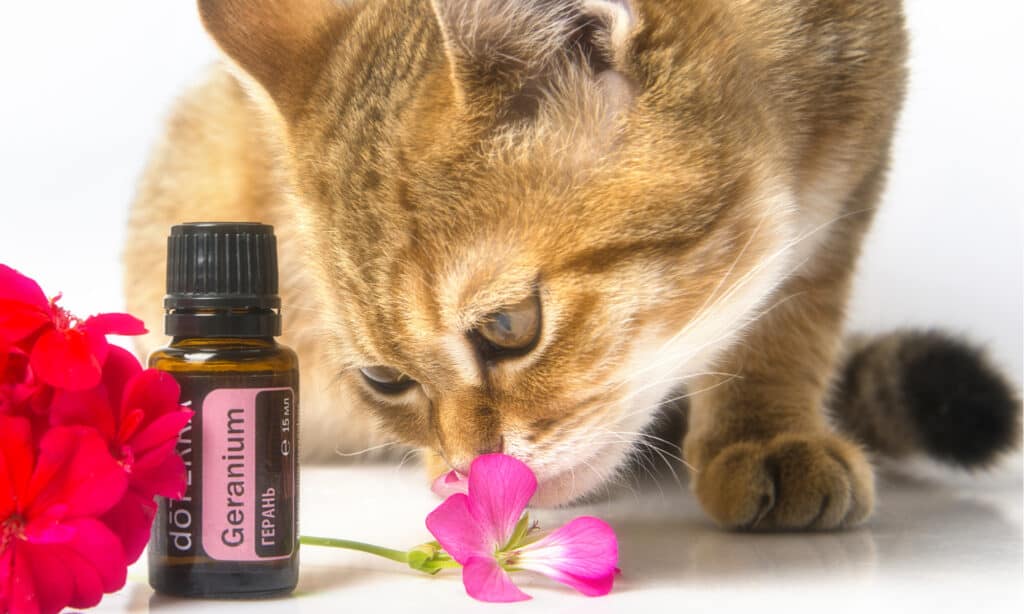The uses and benefits of essential oils are amazing. According to advocates, these natural compounds deliver many benefits. They diffuse an inviting aroma into your home, uplift your mood, fight bacteria, boost cleaning products, and make beauty products work better. The problem is that many of them are toxic to cats.
Before you unleash the DIY cleaner or turn on the diffuser, here is what cat owners need to know about essential oils.
Cat Owners: Diffuse Essential Oils With Caution
Many essential oils are toxic to cats. The list of which oils are safe and which are toxic is below, but you can diffuse any essential oil without harming your cat if you do it safely.
Cats don’t have the same liver enzymes that humans have, so many of the essential oils we enjoy are toxic to them. However, this primarily becomes a problem if they ingest the oils or get them on their skin.
Most of what cats (and people) eat and drink are processed by their livers. Your cat’s liver will be exposed to toxic acids if they eat unsafe oils or clean it off of their fur. You also want to protect their eyes, ears, nose, and genitals from any oils that are toxic to them.
That said, diffused oils are very diluted and don’t have the same impact as when they are applied directly. Here are the important cautions to take to protect your cat:
- Don’t diffuse in a small room or enclosed space.
- Use the diffuser for a short period, like an hour in the morning or evening.
- Make sure your cat can escape to a scent-free room.
- Clean up drips and spills immediately to prevent any accidental contact.
- Place the diffuser so your cat won’t have access.
- Locate the diffuser far away from your cat’s bed or favorite lounging spots.
If you are worried at all about preventing your cat from touching the diffuser or not having enough ventilation, only use diffuse essential oils that are safe for cats.

Don’t Assume Safe Plants Make Safe Oils
Essential oils are made from plants but are highly concentrated. The distillation process means that the essential oils deliver many more organic compounds than the plants used to make them. The essential oils are still toxic, even if your cat might not react to a stroll over fallen pine needles or licking a few drops of spilled orange juice off his paw.
Even people can react when certain pure and concentrated essential oils are applied directly to the skin or ingested, so many are diluted with carrier oils and recommended as topical only. Don’t assume that just because you’ve seen your cat eat part of a plant and feel fine that the essential oil is okay because it’s probably not.
Popular Essential Oils for Cleaning That Are Toxic to Cats
Cats love to groom. They look pretty cute, perched in a comfortable spot elegantly contorting. However, suppose they get cleaning products containing toxic essential oils on their paws or fur. In that case, their grooming can be dangerous and lead to liver failure.
Natural and homemade cleaning products are the rage, and there are many you can use that will be healthy for you and your cats. Still, it is crucial you avoid using any cleaning product with these five popular essential oils:
- Tea Tree
- Pine
- Lemon
- Orange
- Mint (any variety)
23 Essential Oils to Avoid With Cats
The ‘ avoid ‘ list is long because cats lack the enzyme in their liver that breaks down phenols and other organic compounds commonly found in essential oils. To protect your cat, you want to avoid the following:
- Basil
- Bergamot
- Camphor
- Birch
- Cinnamon
- Citrus (including lemon and orange)
- Clove
- Dill
- Eucalyptus
- Fennel
- Oregano
- Pennyroyal
- Peppermint
- Pine
- Spearmint
- Sweet birch
- Tea tree (Melaleuca)
- Thyme
- Rosemary
- Wintergreen
- Ylang ylang
- Spearmint
- Wintergreen
Symptoms of a Dangerous Reaction to Essential Oils in Cats
If your cat was exposed to essential oil, some of the signs of a toxic reaction could include:
- Watery eyes or nose
- Drooling
- Tremors or trembling
- Wobbliness or trouble walking
- Vomiting
- Low heart rate
- Lethargy or weakness
- Difficulty breathing (including wheezing, coughing, or panting)
- Pale gums
- Diarrhea
If you see any of these symptoms, get your cat to a veterinarian right away. If you know what they may have been exposed to, make sure and let the vet know when you call.
11 Essential Oils That Are Safe for Cats
Cats are hunters and meat-eaters, so maybe it’s not surprising that so many plant compounds are potentially toxic to them. Fortunately, there are some beautiful scents and essential oils with lovely properties you can use without any worry.
Here are 11 essential oils that you can use around your cat with confidence:

Essential Oils for Fleas and Ticks on Your Cat
In some areas where fleas and ticks are rampant, it’s hard to avoid using the over-the-counter flea and tick medications. Essential oils aren’t going to replace products like Frontline or Advantage available at the pet store and through your vet. This is especially true if your cat goes outdoors.
However, for the off-season, indoor cats, or areas with less of a problem, four essential oils help keep fleas and ticks off your cat.
Lavender and chamomille kill fleas and protect your cat. Geranium helps repel fleas and ticks.
Make sure you dilute the essential oils before applying! Mix four drops of lavender, chamomile, geranium, or a combination in a cup of water and spray on your cat’s fur. Avoid the face!
Use Essential Oils Safely Around Your Cat
If your cat has liver problems or compromised liver function, it’s wise to be extra cautious. In that case, it might be best to avoid the essential oils altogether.
Even for healthy cats, dilution is key. If you are applying any essential oil directly to your cat, use a few drops in a spray bottle of water or mix with a carrier oil and apply it where they aren’t likely to lick it – like the back of their neck. You can use the following carrier oils to safely dilute any essential oil.
- Fractionated coconut oil
- Olive oil
- Almond oil
Another important thing to keep in mind is purity. Check out the brand before you buy. Some you find at a grocery store might be mixed with other harmful chemicals.
That’s a lot of cautionary instructions, but our cats are worth it! Essential oils are lovely, and luckily, some of the most delightful scents are safe for cats.
Thank you for reading! Have some feedback for us? Contact the AZ Animals editorial team.




